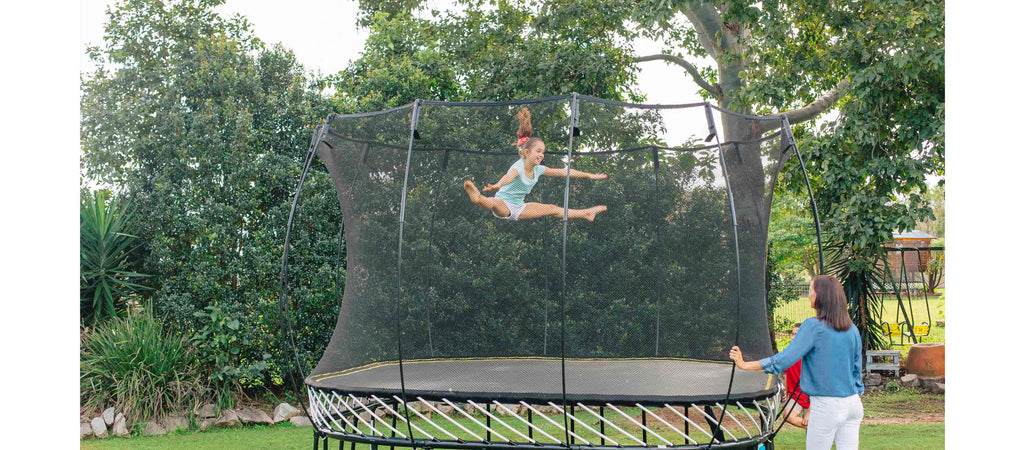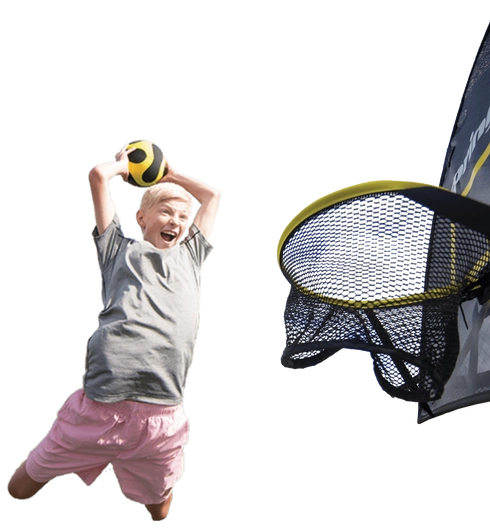What Are the Bounciest Trampoline Brands? | Expert Insight
Curious about which trampoline is the bounciest? Dive into the science behind the bounce and find out which trampolines defy gravity the most!
min read

Curious about which trampoline is the bounciest? Well, you have come to the right place.
Bouncing is not just about reaching great heights; it is a science, and we are here to unveil the secrets. Let's dive into the factors that define trampoline bounce and discover which trampolines defy gravity the most.
4 Factors That Affect the Bounce of a Trampoline
When it comes to the bounciest of a trampoline, several factors are at play. To broaden your understanding of a trampoline’s bounciness, we’re going to go over each of the main ones in detail:
1. Spring vs. Springless Trampolines
The type of trampoline you choose, whether it’s a spring-based or springless model, significantly impacts the bounce quality.
Springless trampolines often provide a smoother, less jarring, bounce compared to traditional spring-based ones.
The springless bounce tends to be easier on your joints while generating a similarly high bounce to spring trampolines.
Spring trampoline, courtesy of Wayfair:

A Springfree Trampoline:

2. Number and Quality of Springs
On spring trampolines, the number and quality of springs are of uber-importance for how bouncy the trampoline will be. Here is some more context:
- Number of springs: Spring count impacts bounce quality by distributing weight evenly, enhancing bounce responsiveness and comfort. More springs distribute force across a larger area, reducing strain and potentially extending trampoline life. A high number of springs will be in the 72-104 range.
- Quality of springs: Quality is as vital as quantity when it comes to springs. Springs that are galvanized and have a protective coating are more resistant to wear and tension.
- Spring tension and length: Optimal spring tension ensures a controlled, uniform bounce. Also, the longer the spring is, the better chance it will provide a solid bounce (although this is only one factor.)
- Spring coil shape: The shape of spring coils affects how they respond and work with the mat and frame to give you a good bounce. Trampolines with springs that are tapered and designed well usually give you a smoother and more predictable bounce.

Photo courtesy of wikiHow.
3. Trampoline Mat Material and Design
The material and design of the trampoline mat are pivotal factors in determining bounce quality. High-quality mats with the right tension contribute to a responsive and consistent bounce.
A high-quality trampoline mat will be made from polypropylene and retain its shape and tension. Cheap trampolines may have mats that sag, stretch or tear, which could result in an uneven bounce.
4. Trampoline Frame Design
Think of a trampoline’s frame like its backbone. It is crucial for absorbing your energy as you jump.
High-quality trampolines will include frames that are made from rust-resistant galvanized steel and will distribute your energy evenly for a smoother bounce. A sturdy frame will also not warp or twist.
The Springfree Trampoline Frame is located safely underneath the trampoline:

7 Tips for Enhancing/Maintaining Your Trampoline’s Bounce
While the trampoline you buy plays a huge role in its bounciness, there are also actions you can take to maintain the bounce. Here are some expert tips for you:
#1: Regularly Inspect Springs and Mat - Check for loose or damaged springs and ensure the trampoline mat is intact. Replace any worn-out or damaged parts promptly.
#2: Proper Spring Tension - Maintain the correct tension in your springs. Adjust spring tension with a spring puller if necessary to ensure of a uniform bounce.
#3: Mat Cleaning - Keep the mat clean and free from debris. Sweeping or lightly hosing it down can help maintain its bounce.
#4: Regular Lubrication - Lubricate the springs and joints with a suitable lubricant, like WD-40, to minimize friction and maximize bounce.
#5: Weight Limit Adherence - Ensure that the trampoline’s weight limit is not exceeded. Overloading can strain the trampoline and affect its bounce quality.
#6: Seasonal Care - During harsh weather, consider protecting your trampoline with a trampoline cover to prevent damage to the mat and springs.
#7: Proper Use - Encourage safe and supervised jumping to minimize stress on the trampoline and maintain its bounce.
FAQ: Trampoline Bounciness
Let’s finish this analysis on which trampolines are the bounciest by answering some common questions:
1. What Shape Trampoline Has the Best Bounce?
Round trampolines are often considered to have the best bounce for a single jumper due to their even distribution of tension and consistent bounce across the mat.
2. What Makes a Trampoline Bouncier?
Several factors affect a trampoline's bounce, including the trampoline’s design, the number and quality of springs, mat tension, and frame sturdiness.
3. Do Trampolines Get Bouncier?
Over time, trampolines can lose some of their bounce due to factors like wear and tear on springs and mat tension changes. Regular maintenance can help maintain bounce quality.
4. Are Springless Trampolines Bouncier?
Springless trampolines can offer a bouncier feel compared to traditional spring-based trampolines because they eliminate hard spots created by springs.
They are also softer on your joints while producing a similar bounce in terms of height to trampolines with springs.
5. Do Springless Trampolines Lose Their Bounce?
While springless trampolines can maintain their bounce well over time, like any trampoline, they may gradually lose some bounce due to mat wear or changes in material properties.
Springfree Trampolines are tested to three million jumps, so they will maintain their bounce much better than other springless trampolines.
Which Trampoline Is the Bounciest for You?
The bounce of a trampoline is more than it seems. There is a science behind how a trampoline produces its bounce and not all bounces are created equal.
You now know all the major factors that affect the bounciest of a trampoline, notable trampolines that produce a solid bounce and tips to ensure your trampoline stays bouncing. But you may still be held up by which trampoline fits your bouncing goals.
If you are still unsure of which trampoline is right for you, we’ve got a free tool that could be a difference-maker for you.
Ready to find the perfect trampoline for your family? Try our Model Comparison Tool to easily compare two different trampoline models and make the right choice today!
